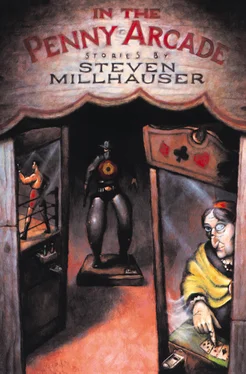“Still,” she added, shading her eyes at the helicopter, “I suppose it would be even more perfect with a blimp. Do you remember that incredible blimp? Nanny from heaven? What in the world ever happened to blimps? At least we still have barges.”
It was her mother who took it up. “Oh yes: Nanny from heaven. I’ll never forget the look on your face as long as I live.” Her own face glowed with it; drowsy in sunlight, Elizabeth smiled. She was just exactly in the mood to be drawn into the circle of family reminiscence. But it really had been incredible: mythical. It was a summer day in her childhood. They had been on this same beach. She remembered nothing except the blimp. There it suddenly was, filling all the sky like a friendly whale — like a great silver cigar — like nothing on earth. It was better than balloons, it was better than a walrus. She had looked up, everyone had looked up, because really there was nothing you could do when a blimp appeared except look up. They always frightened her a little but they were so terribly funny: strange and funny as their name, which of course was the wrong name as her father patiently explained. But still. And so the blimp appeared. And suddenly, it was so wonderful, the sky was full of falling things. Swiftly they came slanting down out of the sky, and all at once the little parachutes opened up, green ones and red ones and yellow ones and blue ones: and slowly slanting down they fell far out in the deep water, and then close by in the shallow water, and then on the sand. People shouted, jumped up to catch them, ran into the water. Elizabeth wanted one so badly that she felt she couldn’t stand it; she wanted to cry, or die. But she stayed very still, she was in awe. And then one landed near her, the little colored cloth at the end of the strings came fluttering down, and she pounced. And it was hers. And it was bread. Two slices of white bread in a little package. And her father said, “Nanny from heaven.” And so she said, “Nanny from heaven.”
“Have you seriously failed to deduce the connection?” said Dr. Halstrom.
Elizabeth turned in amazement. “What in the world are you talking about?”
Her father raised his eyebrows in surprise. “You asked what happened to the blimps.”
“Yes? You know what happened to them? What happened to them?”
“Did something happen to the blimps?” said Mrs. Halstrom.
“You noted the absence of blimps,” said Dr. Halstrom, “and you noted the presence of barges. It occurred to me, in the best manner of contemporary thought, to draw the inevitable conclusion. Consider,” he continued, lowering his voice and leaning toward Elizabeth, “the shape of barges. Carrying off the blimps: you can bet your bottom dollar.”
“What?” said Mrs. Halstrom. “I couldn’t hear you. Bess! What did he say? Tell me what’s so funny! Did something happen to the blimps?” Then she too was laughing, because there was laughter; but they wouldn’t tell her what he had said.
It was a lovely day. The sun burned down. Elizabeth pressed her back and shoulders into the army blanket. Sand was wonderful: it was soft and hard at the same time. It was such a good idea to come to the beach. With momentary irritation she recalled how the trip had very nearly failed to come off. She was suddenly furious. The day had been on the point of foundering because Dr. Halstrom had a paper to finish. She had fretted away the whole morning, exasperated by the unexpected change of plan. It was unfair. He sat shut up in his study on a Saturday in August. It was outrageous. She had set her heart on it. He had been sharp at breakfast, sharp and withdrawn. By noon she no longer cared. She said she no longer cared, but she was desolate. But then he emerged at ten of one, apologetic and triumphant. They had thrown things in the car and left. The tide was out, but that was nothing. They had the whole afternoon.
Elizabeth lay on her own blanket but she had carefully made the edge overlap the edge of her parents’ blanket. She liked to lie down in the sun and they liked to sit on low beach chairs on their blanket while they read. The chairs were so low that her parents could stretch their legs straight out. But the books! It was absurd. Her mother had brought Persuasion . But she was afraid to get sand in it, because it was a present from Elizabeth, and so she had brought a library novel with a vase of red roses on the cover; she said it was awful. Her father had dragged along a fat seventeenth-century anthology, two collections of Milton criticism, and a library novel showing an airplane with a dagger going through it. She herself was no better: Théâtre de Molière , Volume II, and a paperback Larousse, really a ridiculous choice for the beach, and, because she had secretly known it was a ridiculous choice, a science-fiction thing called Dune , which Marcia had recommended, and which was even more ridiculous since she hated science fiction with a passion. But she liked Marcia. So she had brought Dune . It was all ridiculous. Her father had made a joke about carrying coals to Newcastle and Dune to the dunes. He had asked her how she was dune. I’m dune fine, she had said. Her three books lay in a neat pile near her straw beach bag and her father’s books lay scattered on the other side of her. It was ridiculous; absurd. She was lying on a sunny blanket in the middle of a library. Her mother had read for a while and then put aside her awful book, taking off her white beach hat with the broad brim and throwing back her head. Her beautiful hair in sunlight was the color of mahogany: but soft. And finally she had folded up her chair and lain down in the sun. Dr. Halstrom had continued reading, but at last he too had put his book aside, and sat with half-closed eyes looking out at the water. Elizabeth thought he was a dear to have come. He looked almost boyish with his little carefully groomed blond beard so lightly streaked with gray that you could scarcely tell. He had the fine smooth skin of a man not much exposed to weather. His face and forearms had color but his broad chest and upper arms were pale.
“You’d better put your shirt on, Dad. You don’t want to burn.”
“Oh, no. Thanks, Bess. I’m all right. I never burn, except with moral indignation. Plato was right: in a properly ordered republic, that radio would not be tolerated. The lack of consideration of that woman.”
“I can ask her to turn it down.”
“Unfortunately I believe in her God-given right to torment me. I was thinking, though, that your book looks rather forlorn. It ought to be called Forlorna Dune .”
“If you keep mocking my book I won’t tell her to turn it dune.”
And her father laughed, showing his boyish smile with the two handsome hollows in his cheeks like elongated dimples.
It was a lovely drowsy day. Elizabeth felt that her pleasure was probably excessive; her father said she shared with her mother a tendency toward the excessive. Even to Elizabeth the morning’s anger and desolation seemed a little excessive. After all, she was no longer a child. It wasn’t as if they couldn’t have gone to the beach the next day, or even the next. But it was already late in August; she would soon be away at school again; somehow these little family outings had a way of being too casually proposed and too easily abandoned. If she hadn’t fought for it, the day would have been lost. Lately, for no particular reason, Elizabeth had felt the absence of family occasions. Nothing whatever had changed at home: the treasured closeness was there. But she felt there was a carelessness, a danger, in just going on thoughtlessly from day to day. There were only a certain number of days in a lifetime, after all. She really didn’t know how to express it, but she felt that just by existing, just by letting the days flow by, they were all threatened in some way: as if deterioration were bound to set in. She couldn’t account for it. Maybe she was growing morbid. But there were times she felt like saying, as if she were old and they careless and young: don’t you realize that nothing lasts? That one day it will be too late? She had no idea what it would be too late for; she barely knew what it all meant. But she did know there were times when she needed to assert her family feeling.
Читать дальше












